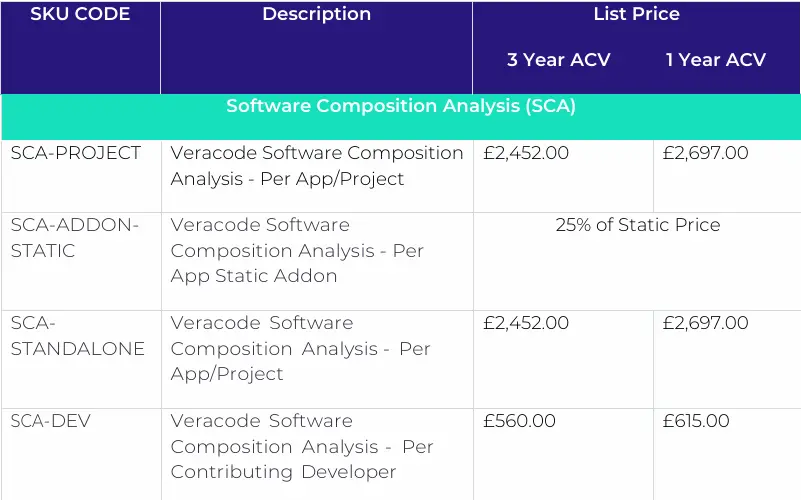
Introduction
When it comes to application security, Veracode remains a leading name in 2025. The company offers a unified Application Risk Management platform that includes SAST, DAST, SCA, IaC scanning, and more, aimed at helping organizations detect, prioritize, and remediate vulnerabilities across the software development lifecycle.
Veracode emphasizes AI-driven risk management, compliance reporting, and integrations with developer workflows to enable faster delivery without compromising security.
However, enterprise security needs have shifted. Teams now expect clearer pricing, faster feedback, more integration with CI/CD, and tools that scale well without massive overhead. For many, Veracode’s custom quotes, high entry costs, and enterprise focus raise the question: is Veracode still worth it for 2025? In this guide, we’ll explore Veracode’s pricing across SAST, DAST, SCA, and platform offerings, examine cost drivers, and compare alternatives that offer competitive features with more transparency.
Veracode pricing overview
Veracode’s pricing in 2025 starts at approximately $15,000/year for basic solutions and can go well above $100,000/year for full enterprise suites. The cost depends heavily on number of applications, scan frequency and depth, lines of code, feature modules, and support levels. Veracode offers standalone SAST, DAST, SCA, or combinations, and enterprise discounts or custom terms are common.
Pricing comparison table
| Product category | Best alternative | Alternative pricing | Key advantage | Best for |
|---|---|---|---|---|
| SAST | Snyk Code | $25/dev/month | Developer-friendly, real-time feedback | Developer-first teams |
| DAST | Beagle Security | $119/month | AI-powered, modern app support | Web apps, APIs, SPAs |
| SCA | Mend.io | $1,000/dev/year | Transparent pricing, deep compliance | Enterprise compliance needs |
| Platform | Checkmarx One | Lower custom quotes | Flexible deployment, customization | Enterprise AppSec platforms |
Veracode SAST pricing and alternatives
About Veracode SAST
Veracode’s static application security testing (SAST) is one of its flagship products. It takes a binary analysis approach, scanning compiled code instead of source code. This is appealing to industries like finance or government that may be reluctant to share source code. Veracode SAST also comes with enterprise features like policy management, compliance dashboards, and integration into CI/CD pipelines. However, the drawbacks are notable. Setup and configuration are complex, results take longer compared to modern developer-focused SAST tools, and the interface is less intuitive for developers. Veracode SAST is best suited for centralized security teams rather than agile developer workflows.
Best alternative: Snyk Code
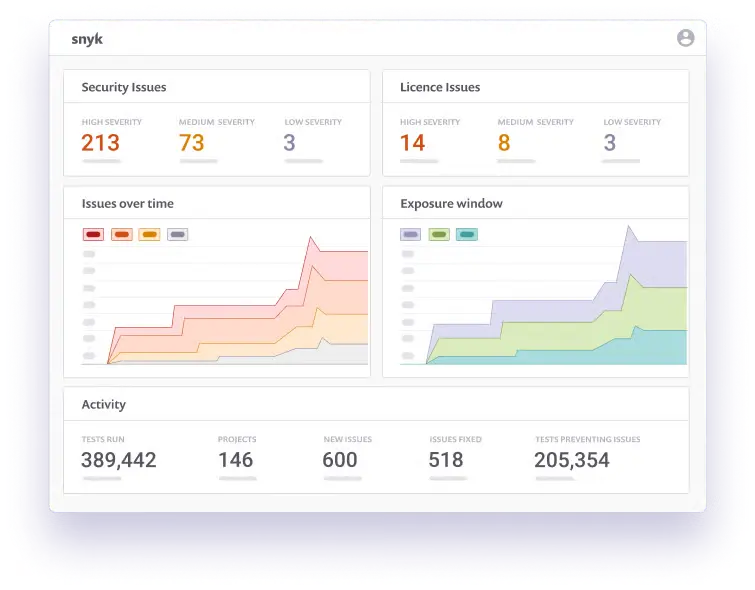
Snyk Code is a modern SAST tool built with developers in mind. It integrates directly into IDEs like VS Code and IntelliJ, providing real-time feedback as developers write code. Unlike Veracode, Snyk offers transparent per-developer pricing, making it predictable and cost-efficient for teams of all sizes.
Key features of Snyk Code
Real-time feedback in IDEs
Broad language and framework support
Automated remediation guidance
Seamless CI/CD and SCM integrations (GitHub, GitLab, Bitbucket)
Pricing
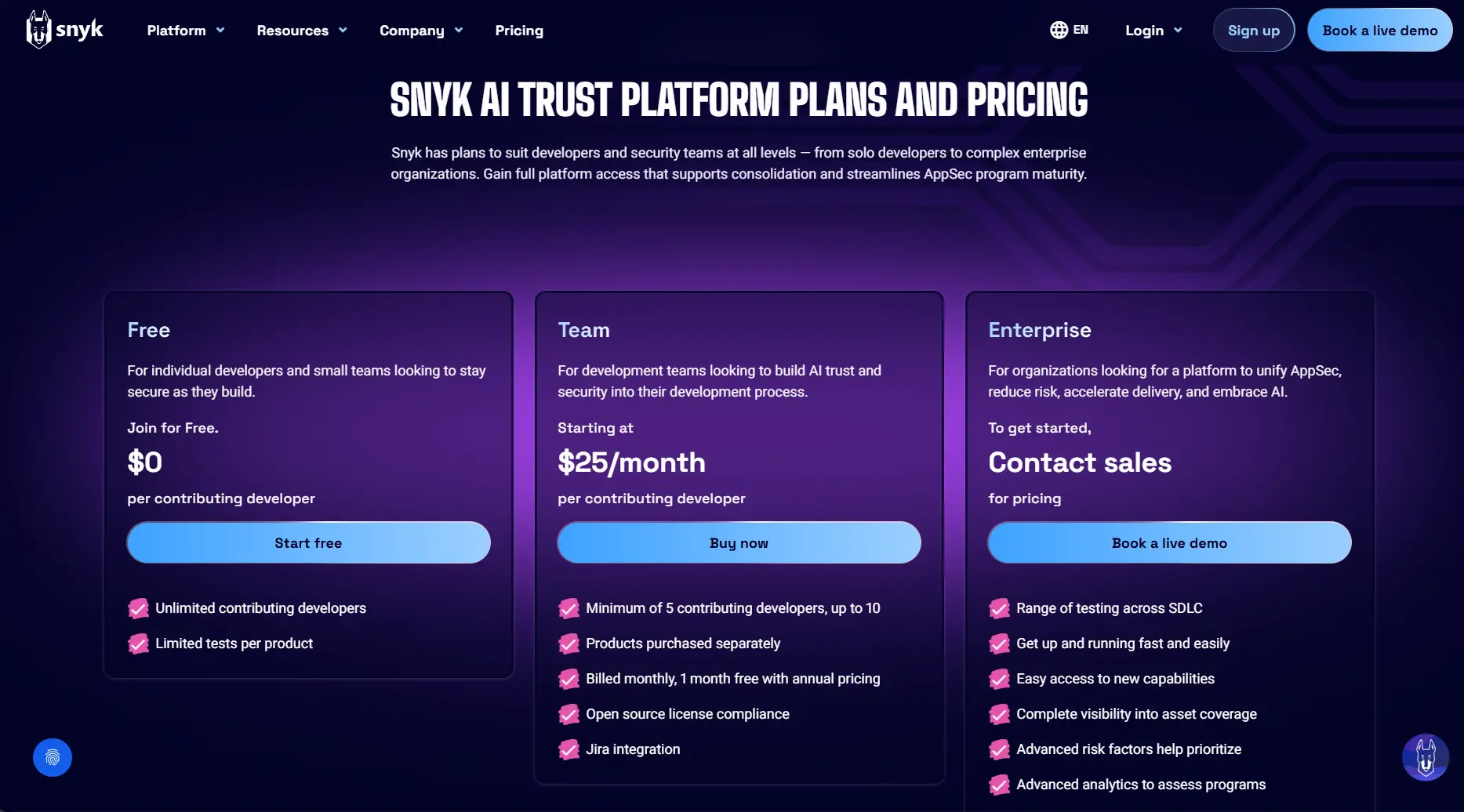
Free tier available
Team: $25 per developer/month
Enterprise: Custom quotes
Ratings and reviews
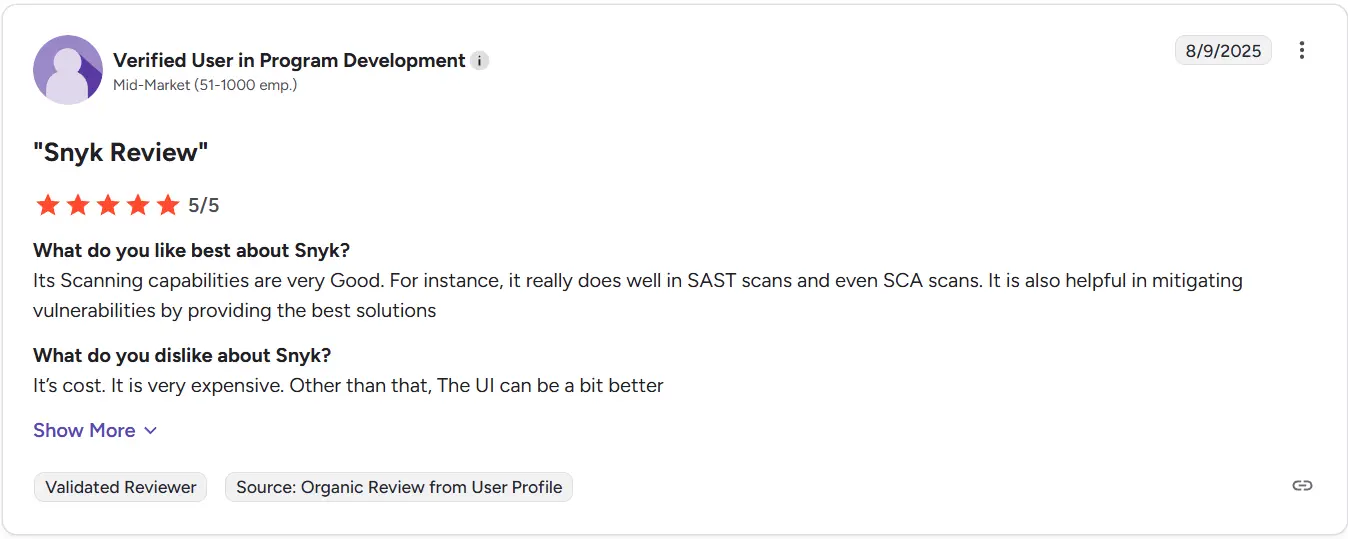
Snyk has a G2 rating of 4.5/5. Users consistently praise its developer-first approach, seamless integrations with IDEs and CI/CD, and the speed of its real-time feedback. The transparent pricing model is a major plus, though some reviewers note costs can climb quickly for large enterprises. Overall, it remains one of the most effective and user-friendly SAST tools in the market.
Veracode DAST pricing and alternatives
About Veracode DAST
Veracode’s dynamic application security testing (DAST) scans live applications for vulnerabilities. It supports traditional web apps and APIs, and offers compliance-ready reporting for enterprises. However, its capabilities are limited for modern use cases like single-page applications (SPAs), GraphQL APIs, and complex authentication flows. It also relies heavily on signature-based scanning, which can generate false positives.
Best alternative: Beagle Security
Beagle Security offers a modern, AI-powered approach to DAST. Instead of traditional signature-based scanning, it uses AI-driven penetration testing to simulate real-world attacks. This allows it to detect vulnerabilities such as business logic flaws, authorization bypasses, and workflow issues that Veracode often misses.
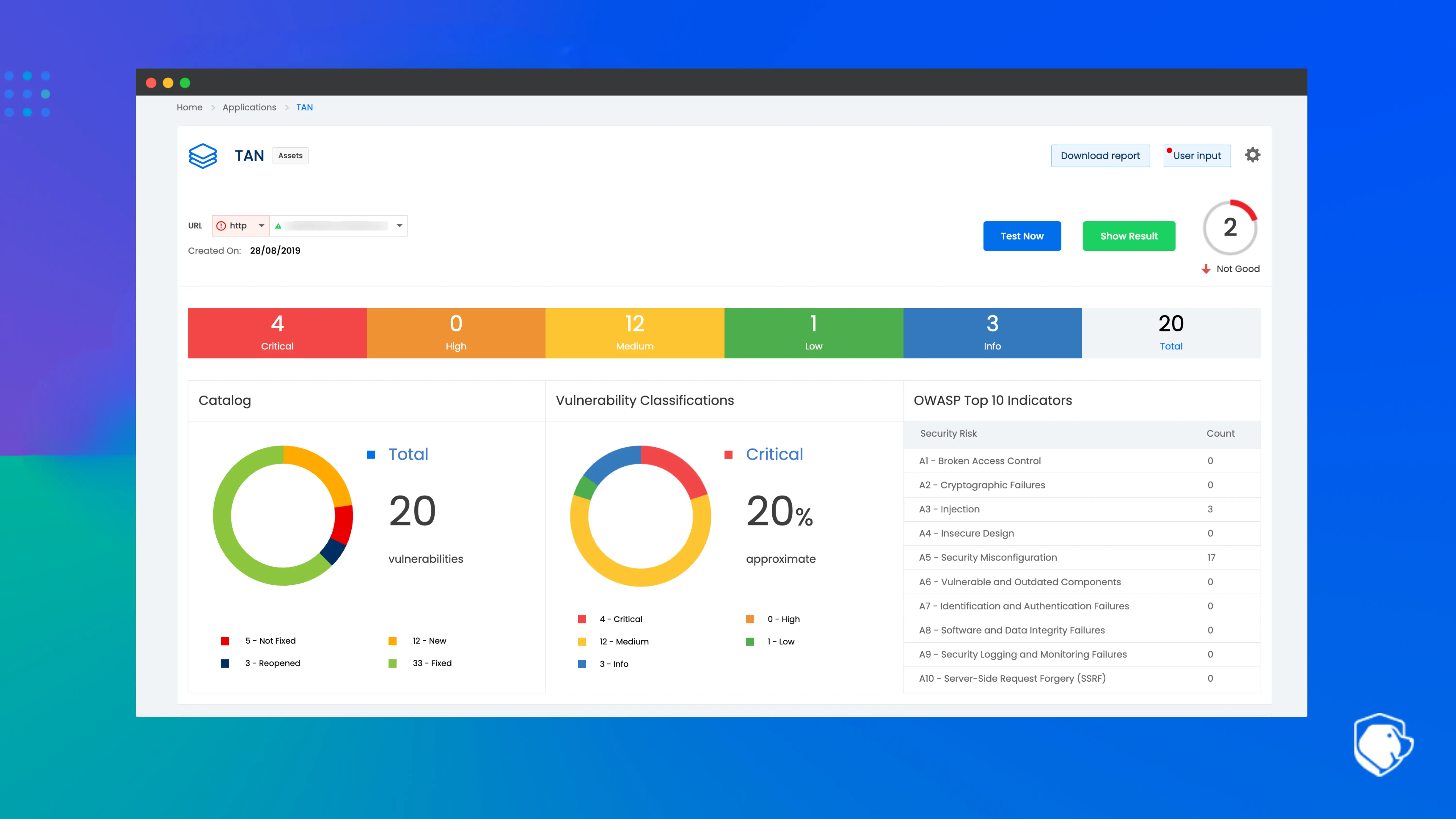
Beagle Security is also praised for near-zero false positives, developer-friendly reporting, and strong support for APIs and SPAs. With transparent, affordable pricing, it provides up to 85% cost savings compared to Veracode DAST.
Key features of Beagle Security
AI-powered penetration testing
Zero false positives with validated results
Full support for REST and GraphQL APIs
SPA and modern app testing capabilities
CI/CD integrations for DevSecOps workflows
Pricing
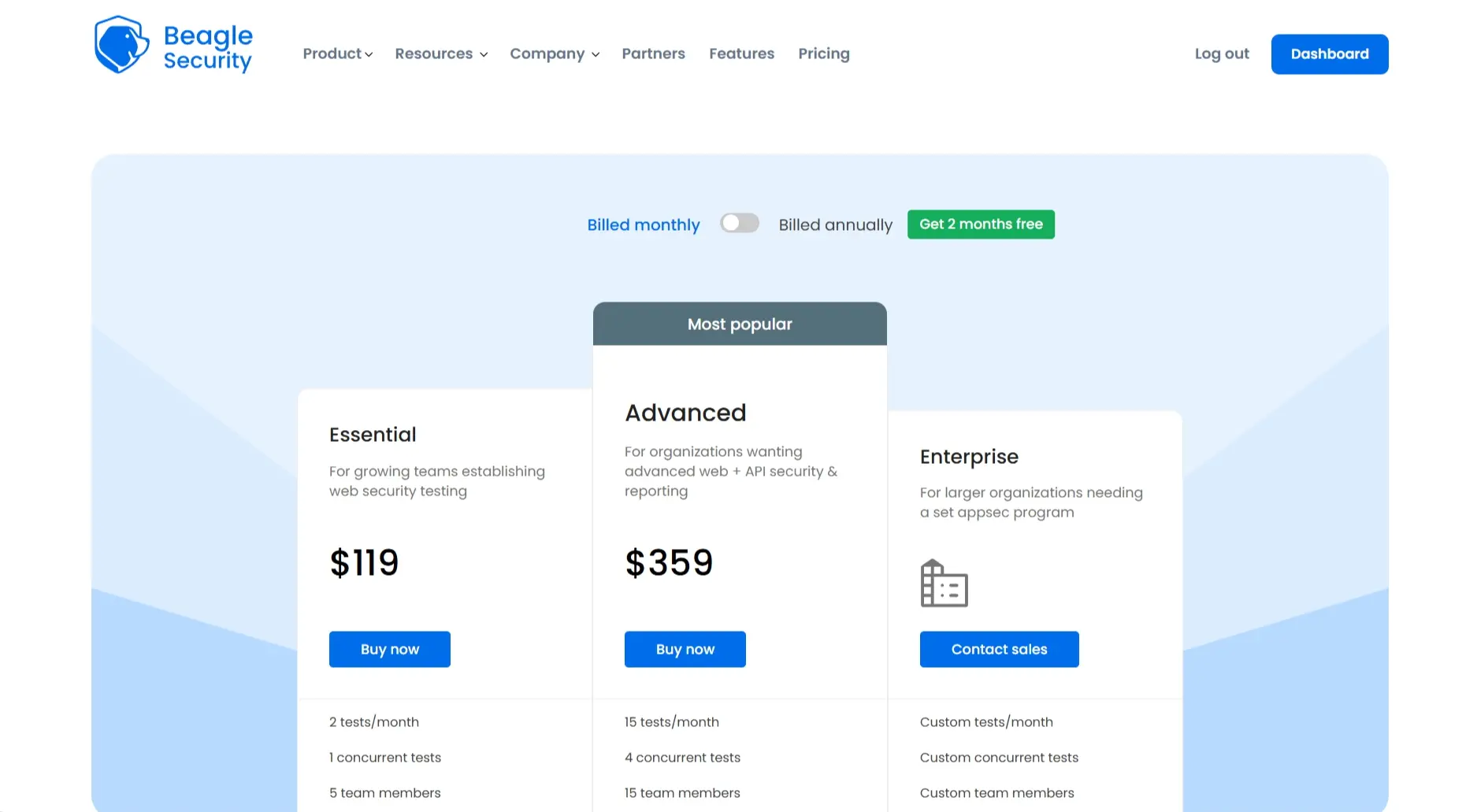
Essential: $119/month
Advanced: $359/month
Enterprise: From $6,850/year
Ratings and reviews
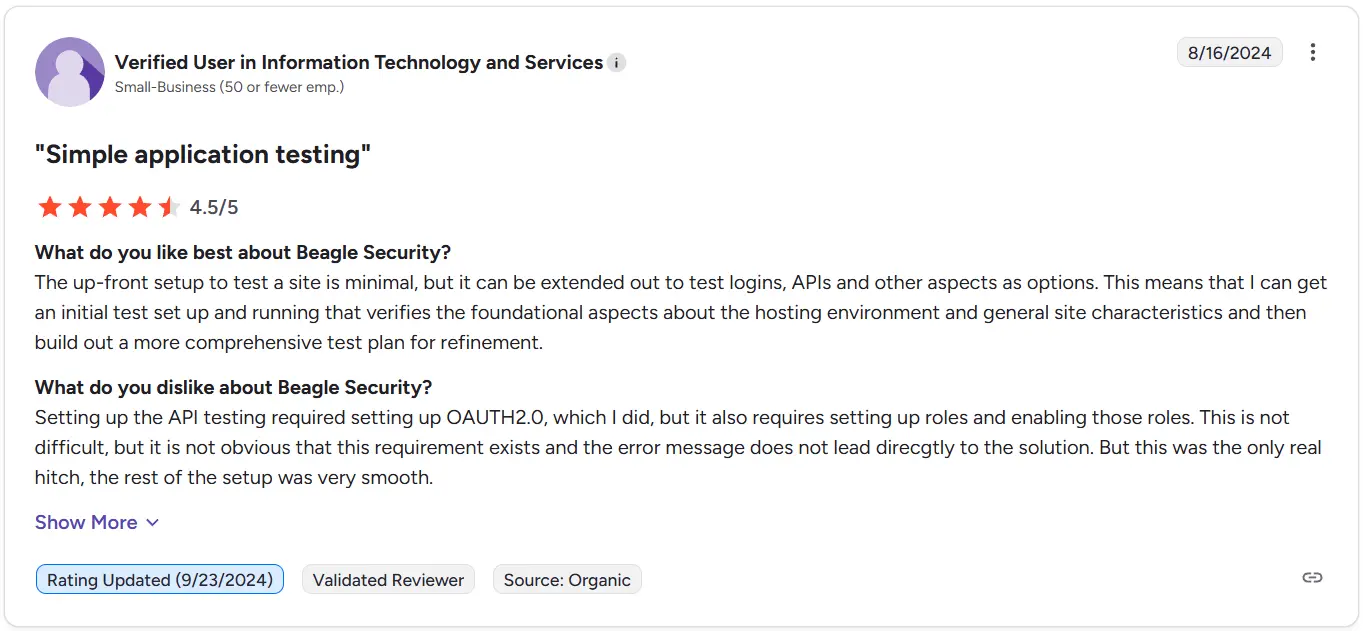
Beagle Security has a G2 rating of 4.7/5. Reviewers highlight its accuracy, low false positive rate, and advanced API and SPA testing capabilities, which make it stand out compared to legacy DAST tools. Many users find it easy to set up and value the detailed remediation guidance, though some mention a bit of a learning curve at first. Its responsive customer support and modern, developer-friendly design consistently receive high praise.
Veracode SCA pricing and alternatives
About Veracode SCA
Veracode’s software composition analysis (SCA) helps organizations manage risks from open-source components. It identifies vulnerable dependencies, tracks license compliance, and generates SBOMs for regulatory needs.
However, Veracode SCA comes at a premium cost, typically starting around $12,000 per year, and its license management and automation features are less advanced than specialized competitors.
Best alternative: Mend.io
Mend.io (formerly WhiteSource) is a leading SCA solution that provides deep license compliance, automated dependency updates, and AI-powered exploitability analysis. Its transparent per-developer pricing makes it predictable and budget-friendly, unlike Veracode’s opaque model.
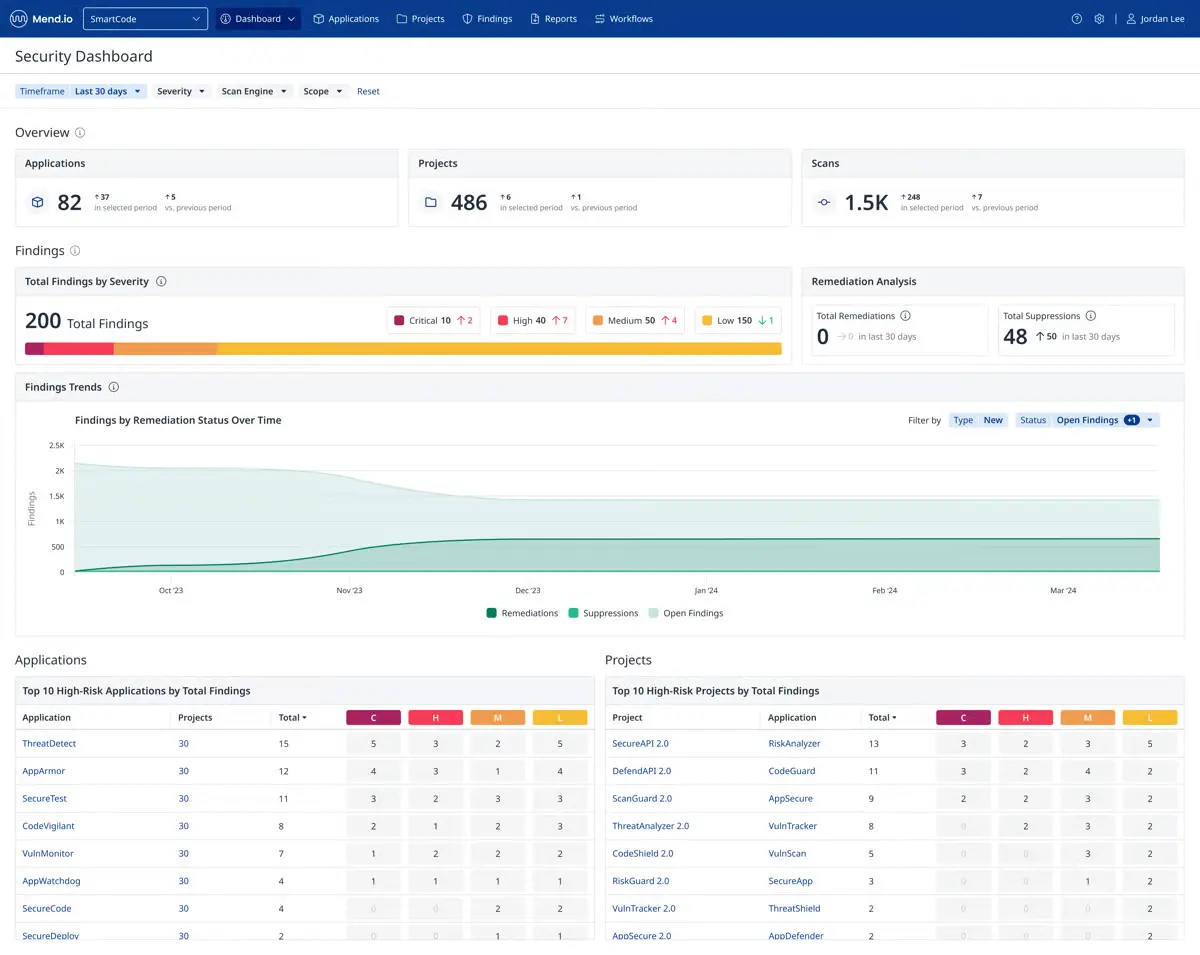
Key features of Mend.io
Comprehensive license compliance management
Automated dependency updates with Mend Renovate
AI-based exploitability insights
SBOM generation and compliance mapping
Pricing
From $1,000 per developer/year
Enterprise plans available
Ratings and reviews
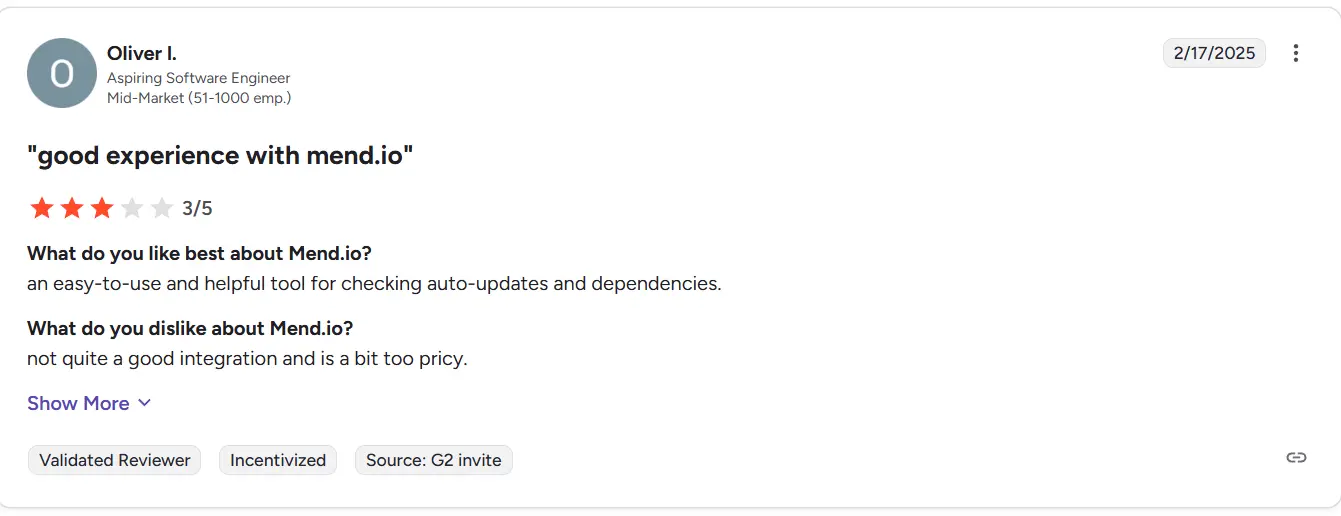
Mend.io holds a 4.5/5 G2 rating. Users appreciate its comprehensive license compliance management, SBOM generation, and automated dependency updates that save developer time. While some note complexity in large-scale deployments, most find it significantly easier to use and more transparent in pricing than enterprise competitors. It is often praised as a reliable, feature-rich SCA solution for enterprises with compliance needs.
Veracode platform pricing and alternatives
About Veracode platform
Veracode One, the company’s unified platform, bundles SAST, DAST, and SCA under one roof. It is designed for enterprises that want centralized security governance and compliance tracking.
While its breadth of coverage is attractive, the costs are among the highest in the industry. Full platform deployments frequently exceed $100,000 annually, with some large enterprises paying over $500,000 per year. Veracode’s SaaS-only model also limits flexibility for organizations that prefer hybrid or on-premises deployment.
Best alternative: Checkmarx One
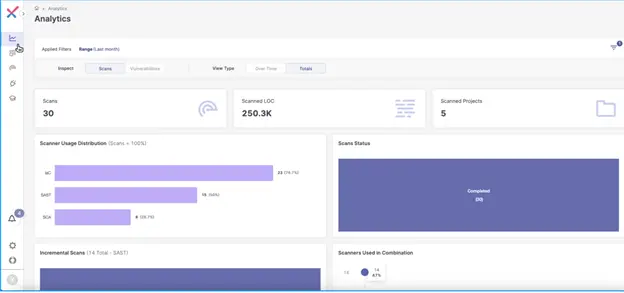
Checkmarx One is a direct competitor to Veracode One, offering SAST, DAST, SCA, API security, and infrastructure-as-code scanning in a unified platform. Unlike Veracode, Checkmarx supports cloud, on-premises, and hybrid deployments, giving customers more control. Pricing is typically lower than Veracode, and Checkmarx is often praised for its customization capabilities, particularly through its proprietary query language (CxQL).
Key features of Checkmarx One
Unified coverage across SAST, DAST, SCA, API security, IaC scanning
Flexible deployment: Cloud, on-premises, hybrid
Advanced customization via CxQL
Strong enterprise compliance and governance tools
Pricing
Custom quotes
Generally more affordable than Veracode for equivalent coverage
Ratings and reviews
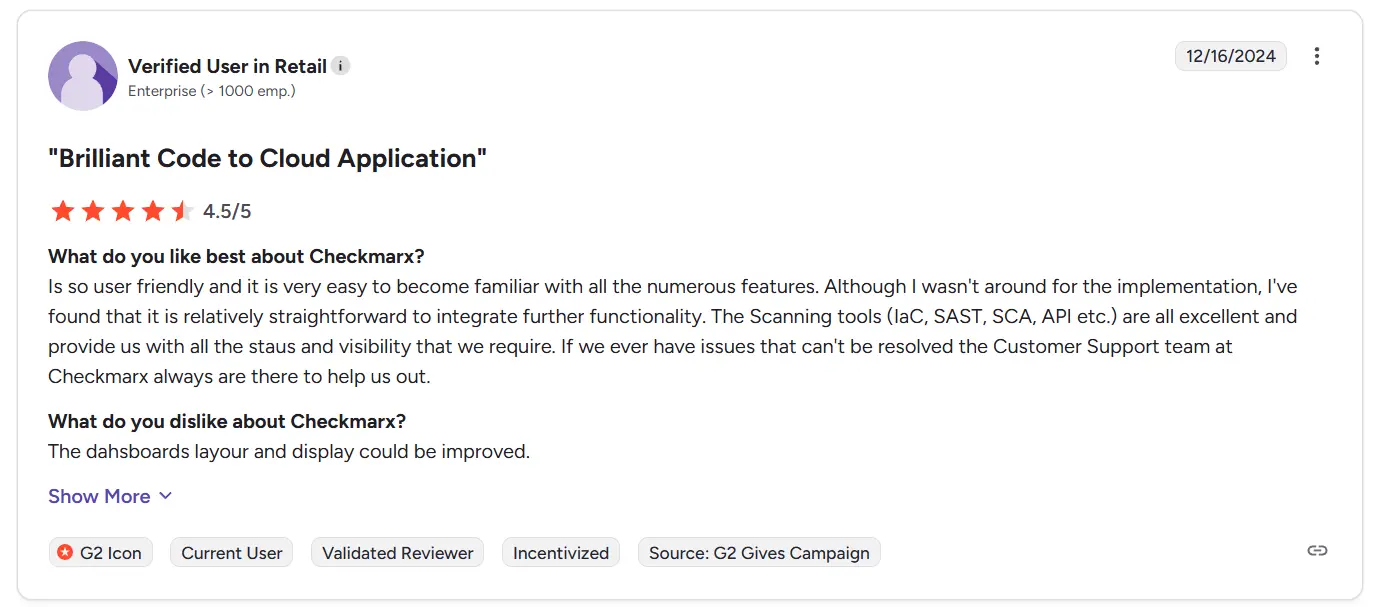
Mend.io holds a 4.5/5 G2 rating. Users appreciate its comprehensive license compliance management, SBOM generation, and automated dependency updates that save developer time. While some note complexity in large-scale deployments, most find it significantly easier to use and more transparent in pricing than enterprise competitors. It is often praised as a reliable, feature-rich SCA solution for enterprises with compliance needs.
Factors influencing Veracode pricing
Several factors drive the final Veracode bill:
Number of applications: Pricing scales with applications under coverage.
Scan frequency: More frequent scans mean higher costs.
Lines of code: Large codebases increase complexity and price.
Enterprise features: Premium reporting and compliance add-ons drive costs up.
Support level: Standard vs premium support significantly impacts pricing.
Contract terms: Multi-year agreements may offer discounts but increase vendor lock-in.
Is Veracode pricing worth it in 2025?
Veracode continues to hold a strong position in 2025 as a comprehensive enterprise application security platform, offering SAST, DAST, and SCA in a unified solution. Its enterprise-grade features and compliance reporting make it a dependable choice for highly regulated industries, but the lack of pricing transparency and high total cost of ownership remain significant drawbacks.
For small to mid-sized teams or developer-driven organizations, Beagle Security often stands out as the most practical alternative. Its blend of affordability, accuracy, and modern application support, covering APIs, SPAs, and complex authentication, makes it especially attractive for teams that want enterprise-grade testing capabilities without the overhead of a legacy platform. Beyond Beagle Security, other solutions such as Snyk Code, Mend.io, and Checkmarx One also provide strong alternatives, each with unique strengths like developer-first workflows, advanced SCA capabilities, or comprehensive platform coverage.
The right choice ultimately depends on your organization’s size, compliance priorities, and whether a centralized enterprise platform or a modern, best-of-breed toolkit delivers the best long-term return on investment.
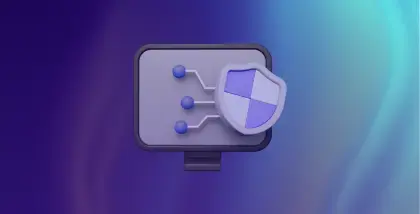


![Acunetix vs Nessus: Which is right for you? [2026] Acunetix vs Nessus: Which is right for you? [2026]](/blog/images/acunetix-vs-nessus-which-is-right-for-you-2026-cover.webp)
![OpenVAS vs Nessus: Which is the best choice for you? [2025] OpenVAS vs Nessus: Which is the best choice for you? [2025]](/blog/images/openvas-vs-nessus-which-is-the-best-choice-for-you-2025-cover.webp)


![Top enterprise application security tools [2026] Top enterprise application security tools [2026]](/blog/images/blog-banner-four-cover.webp)
![Top vendor application security testing tools [2026] Top vendor application security testing tools [2026]](/blog/images/blog-banner-six-cover.webp)
![Best API security tool for developers [2026] Best API security tool for developers [2026]](/blog/images/blog-banner-five-cover.webp)

![Top Bright Security alternatives [2026] Top Bright Security alternatives [2026]](/blog/images/blog-banner-one-cover.webp)